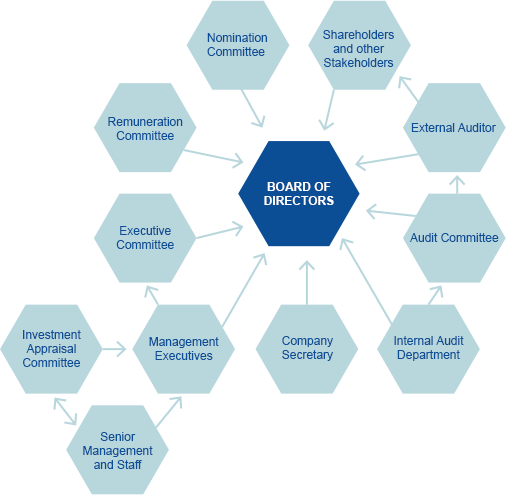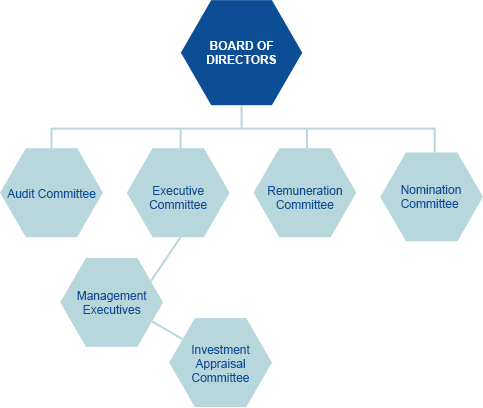Corporate Governance
Corporate Governance Structure
The Group is dedicated to observing effective corporate governance practices and has established a solid corporate governance framework with a clearly defined internal control system and comprehensive risk management system. It is designed to monitor the company’s overall operating performance, ensures the efficient use of resources, and enhances corporate transparency and accountability. This will facilitate the creation of enterprise value and guarantee sustainable development, and ultimately accountable to shareholders through which their interests will be protected.
The Group has a sound corporate governance structure that in the course of making business decisions, enables the Board to always place considerable importance on the interests of its shareholders and other stakeholders. Through a sound, solid and rational corporate governance structure, authorities were delegated to respective committees for the implementation of corporate governance measures formulated by the Board:

Board of Directors
The Board of Directors represents the highest level of authority in the governance structure of the Company. It is mainly responsible for formulating the Group’s long term business development strategies and operational direction, monitoring the Group’s business and financial performance, as well as leading and supervising the management to ensure thorough implementation of the Board’s resolutions and effective performance of their duties.
The Company has established four committees under the Board. All committees are responsible to the Board, and shall report to the Board on the decisions or advice they made.

Executive Committee
The Executive Committee is a decision-making administrative body under the Board, with the primary responsibility of taking charge of the Company’s day-to-day business, ensuring proper execution of the resolutions approved by the Board and at the general meetings, and reviewing major business activities and investments and reporting to the Board.
Management Executives
The implementation of the decisions of the Executive Committee is delegated to the Management Executives and the functional departments.
Investment Appraisal Committee
The Company has established an Investment Appraisal Committee to evaluate its investment projects from different perspectives with professional competence and views given by various functional departments based on the Company’s overall business investment strategies. After thorough analysis and discussion of key project elements, such as industry background, organizational structure, business development plans, return on investment, financial risk and legal risk issues, the committee will form independent professional advice and submit recommendations and reports to the Management Executives for consideration. Such appraisals will then be submitted to the Executive Committee for approval according to procedures governing corporate investment decision-making processes. The Investment Appraisal Committee mainly comprises functional departments at the Hong Kong headquarters. Current members of the committee are the Head of the Investment Operations Department, the Company Secretary, the Chief Legal and Compliance Officer and the Chief Financial Officer.
Audit Committee
The Audit Committee is a standing committee under the Board and plays a vital role in corporate governance. The committee is mainly responsible for reviewing accounting policies and practices adopted by the Group. It also discusses matters relating to financial reporting as well as internal control and risk management, selects, appoints and dismisses external auditor and monitors the relationship between the Company and external auditor and makes recommendations to the Board accordingly.
Terms of Reference of Audit Committee
Remuneration Committee
The Remuneration Committee is mainly responsible for reviewing the remuneration policy and structure of the Company as a whole and ensures effective implementation of such policies. The committee also makes recommendations to the Board on the establishment of formal and transparent procedures for setting remuneration policy and structure in regard to the Directors and senior management.
Terms of Reference of Remuneration Committee
Nomination Committee
The committee is mainly responsible for setting procedures of appointing new directors and director succession plans with high transparency and making advice to the Board for candidates of new directors or for filling casual vacancies of the Board. The process of nomination starts from recommending a candidate to the committee by the controlling shareholder of the Company, after which the committee will submit to the Board for consideration according to the working experience, expertise and education background required for the position and the time and effort that the candidate can contribute to the Company.
Terms of Reference of Nomination Committee